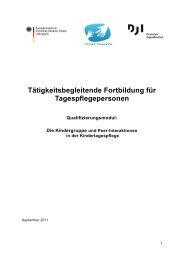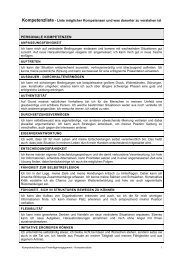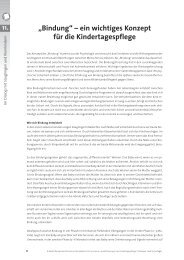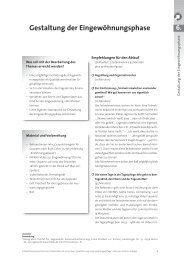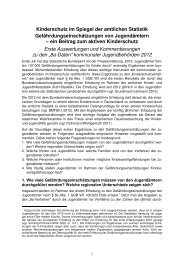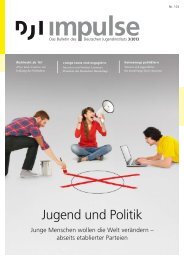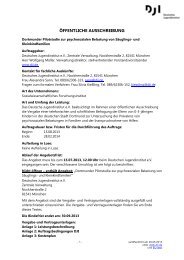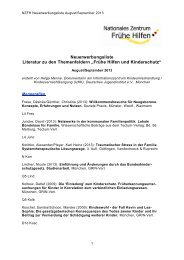download - Deutsches Jugendinstitut e.V.
download - Deutsches Jugendinstitut e.V.
download - Deutsches Jugendinstitut e.V.
You also want an ePaper? Increase the reach of your titles
YUMPU automatically turns print PDFs into web optimized ePapers that Google loves.
The European welfare systems – including those of the participating countries in this<br />
documented experts’ conference – are currently under great pressure to change, as socioeconomic<br />
and demographic developments accelerating the development of poverty are<br />
producing strong emigrational movement and social and environmental segregation. The<br />
immediacy of these problems has led to a partial watering down of the relevant welfare-sate<br />
orientation on the level of programmes and strategies in participating nations in the fight<br />
against social disadvantages for children and young persons. A variety of developments and<br />
changes on a European level are responsible for this situation, for example the increasing<br />
employment of women which has a varying influence on the structure of social security<br />
systems in each individual country. Cross-border communication, intensified through the<br />
development of a European youth policy motivated by Berlin and Strasbourg and expert<br />
conferences such as the one documented here, has also played a part in the creation of<br />
conceptual harmonisation which is in part progressively displaying effects which are less<br />
dependent on welfare state traditions. Family-oriented nations develop structures which act<br />
in intermediatory fashion between the state and family and thereby encourage<br />
developments within the field of civil society. Countries such as Germany with a strong<br />
welfare tradition are becoming reoriented and are providing more scope for activating<br />
strategies targeting the individual resources of disadvantaged children and young persons.<br />
This reorientation is however also partially due to the fact that the German welfare state in<br />
its traditional form is becoming progressively more difficult to finance. Strongly liberal<br />
oriented countries such as Great Britain permit a greater influence on the part of the state.<br />
The term “Third Way”, coined in Great Britain by Anthony Giddens, which was<br />
incorporated into the conceptual programme of Tony Blair’s New Labour strategy and<br />
exerted an influence on a substantial part of European Social Democracy, is the expression<br />
of this approach based on the fundamental orientation of Neo-liberalism and classical<br />
welfare concepts (Giddens, 1997, 1998; Dingeldey 2006). Similarly, the concentration of<br />
social problem complexes in many Western European countries in specific districts, urban<br />
areas or rural regions seemingly irrespective of their welfare state context has led to the<br />
development of (social) environmental programmes which are comparable on a European<br />
level and resulted in approaches within the conceptual and management levels of strategies<br />
and programmes.<br />
These conceptual approaches, above all in West European nations, could be clearly<br />
observed during the conference.<br />
The programmes presented by the participating countries can be roughly divided into<br />
two groups:<br />
a) programmes with across-the-board content, planned over a longer period of time<br />
and also implemented transversally on national, regional and local levels. This<br />
includes the programmes and strategies of Great Britain, France, Portugal, Ireland<br />
and Germany.<br />
b) programmes approaching concrete problems which can be categorised under<br />
specific themes; these are partially conceived on a transversal basis, but<br />
implemented strictly according to individual departments. This includes the<br />
programmes of Hungary, Poland, the Czech Republic and Lithuania.<br />
109



